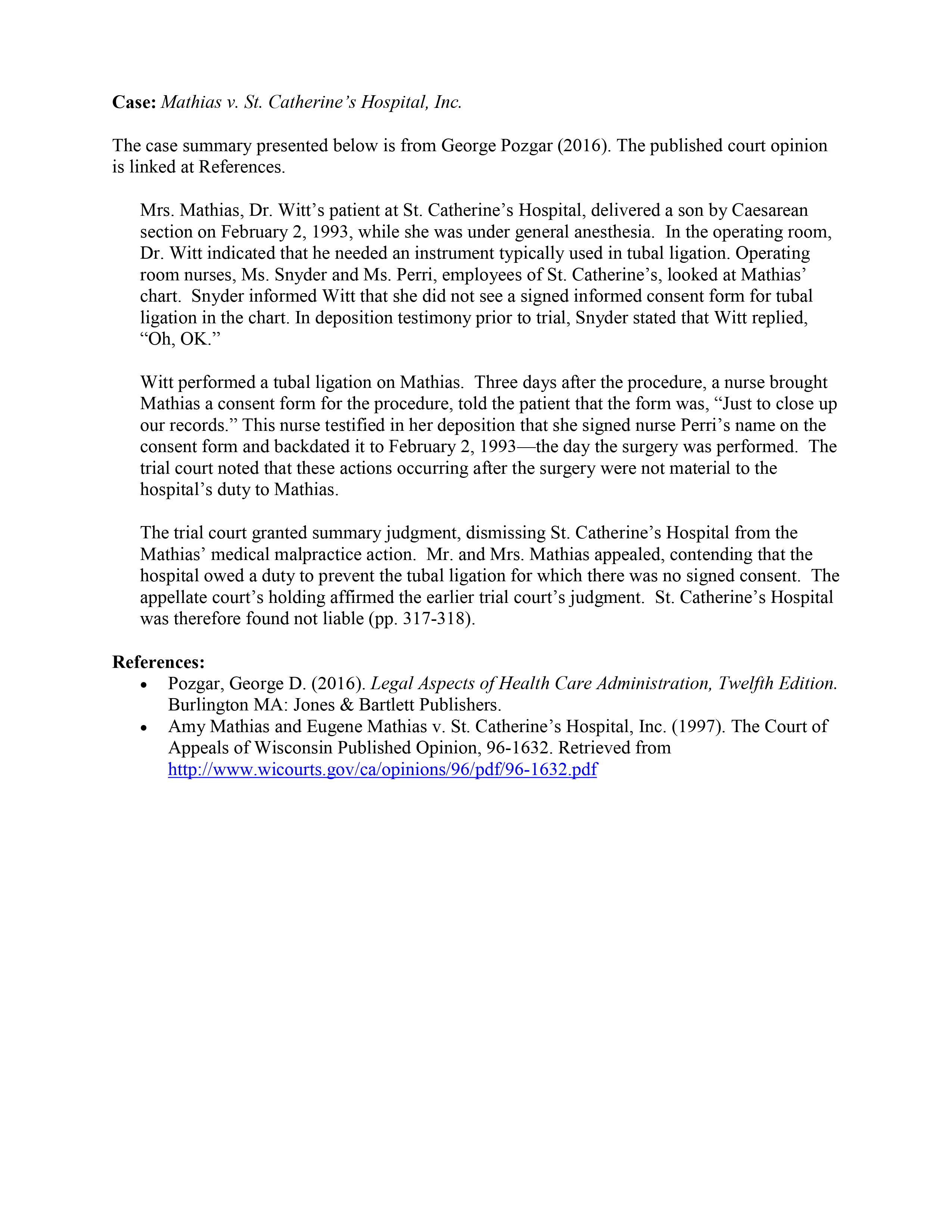Answered step by step
Verified Expert Solution
Question
1 Approved Answer
What legal theories could be used to support the appellate court's decision in this case? What other party (or parties) might have been sued in
- What legal theories could be used to support the appellate court's decision in this case?
- What other party (or parties) might have been sued in this case, and using what theory (theories) of liability?
- Based on this case, what risk management concern(s) do you have regarding the hospital's informed consent practices?
- What ethical principles apply in a case such as this?
Cite sources that are ?referenced

Case: Mathias v. St. Catherine's Hospital, Inc. The case summary presented below is from George Pozgar (2016). The published court opinion is linked at References. Mrs. Mathias, Dr. Witt's patient at St. Catherine's Hospital, delivered a son by Caesarean section on February 2, 1993, while she was under general anesthesia. In the operating room, Dr. Witt indicated that he needed an instrument typically used in tubal ligation. Operating room nurses, Ms. Snyder and Ms. Perri, employees of St. Catherine's, looked at Mathias' chart. Snyder informed Witt that she did not see a signed informed consent form for tubal ligation in the chart. In deposition testimony prior to trial, Snyder stated that Witt replied, "Oh, OK." Witt performed a tubal ligation on Mathias. Three days after the procedure, a nurse brought Mathias a consent form for the procedure, told the patient that the form was, "Just to close up our records." This nurse testified in her deposition that she signed nurse Perri's name on the consent form and backdated it to February 2, 1993the day the surgery was performed. The trial court noted that these actions occurring after the surgery were not material to the hospital's duty to Mathias. The trial court granted summary judgment, dismissing St. Catherine's Hospital from the Mathias' medical malpractice action. Mr. and Mrs. Mathias appealed, contending that the hospital owed a duty to prevent the tubal ligation for which there was no signed consent. The appellate court's holding affirmed the earlier trial court's judgment. St. Catherine's Hospital was therefore found not liable (pp. 317-318). References: Pozgar, George D. (2016). Legal Aspects of Health Care Administration, Twelfth Edition. Burlington MA: Jones & Bartlett Publishers. Amy Mathias and Eugene Mathias v. St. Catherine's Hospital, Inc. (1997). The Court of Appeals of Wisconsin Published Opinion, 96-1632. Retrieved from http://www.wicourts.gov/ca/opinions/96/pdf/96-1632.pdf
Step by Step Solution
★★★★★
3.36 Rating (143 Votes )
There are 3 Steps involved in it
Step: 1
1 What legal theories could be used to support the appellate courts decision in this case The legal theories that could be used to support the appellate courts decision in this case are the doctrine o...
Get Instant Access to Expert-Tailored Solutions
See step-by-step solutions with expert insights and AI powered tools for academic success
Step: 2

Step: 3

Ace Your Homework with AI
Get the answers you need in no time with our AI-driven, step-by-step assistance
Get Started


